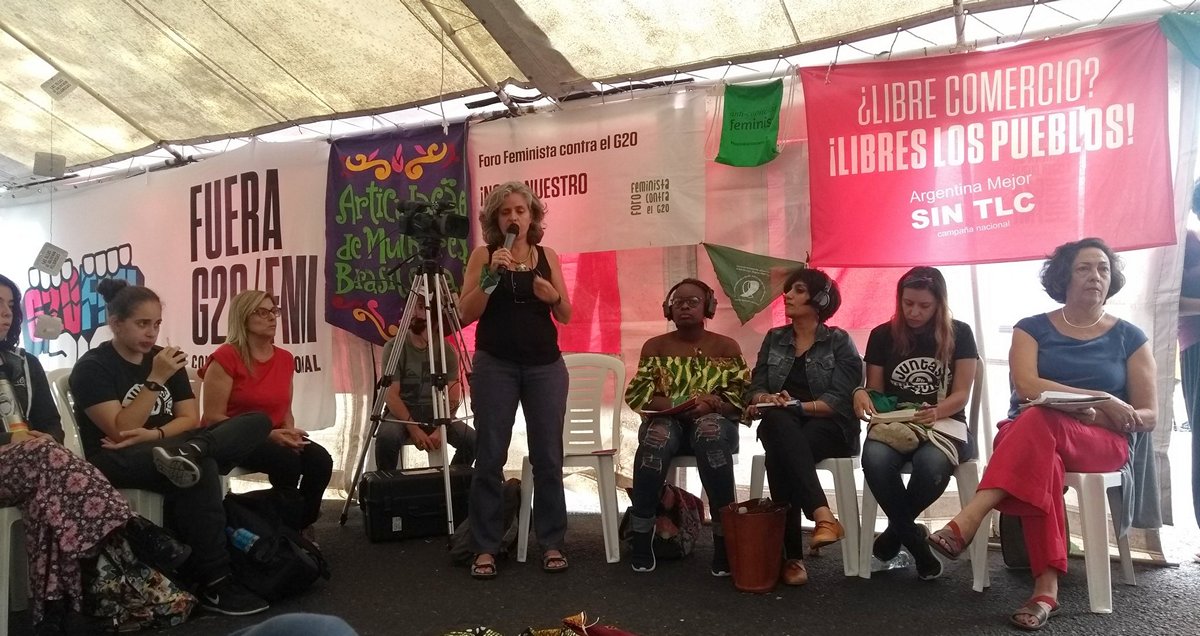
|
December 8, 2018 - No. 43 Universal
Declaration of Human Rights
|
|
Time for a New Direction for the Economy Under the Control of Canadians!
Trudeau Government's Fall Economic Statement
Federal Finance Minister Bill Morneau released a fall economic statement on November 21. The introduction to the statement is an ode to how wonderful Canada's economic situation has become, in the mind of the Trudeau Liberal government, if not in reality. It begins with the suggestion that Canadians chose the current economic plan and the direction of the economy through the election of the Liberal government. This assertion is disinformation as cartel parties come to power within an archaic electoral system that deprives members of the polity of their right to elect and be elected on an equal basis and to set the agenda of what are called election issues. Canadians did not elect the current government, nor any previous government, to hand over billions of dollars in state resources to enrich private monopoly interests. During the last election the Liberals promised changes to the electoral process, at least to rid it of the archaic first-past-the-post system of counting votes, but as soon as they gained power they abandoned their promise and instead have brought in self-serving measures to strengthen the grip of the cartel parties on government.[1]
The fall economic statement does not identify the problems in the economy and propose solutions. Instead it begins with platitudes, "The Government's Plan Is Working. ... Canada's economy is strong and growing.... There are more good, well-paying jobs. ... Canadians' wages are growing. ... Consumer confidence is strong. With more money, more jobs, rising wages, and lower taxes, Canadians are feeling confident about their own financial positions. ... Business profits are up. After-tax profitability of businesses in Canada is elevated compared to its historical average. ... Canada's strong economy is growing federal revenues faster than expenses."
These exaggerated claims, some of which are complete distortions, are meant to cloud the reality of serious economic problems that are not being addressed. The danger of another devastating recession is real. Just in the last few weeks the elimination of industrial jobs at Bombardier and GM has been on everyone's mind. The concentration of social wealth, privilege, power and control in the hands of a few is continuing unabated. The direction of the economy is increasingly in the hands of global oligarchs who have no direct connection with Canada, while governments appear impotent and unwilling to take any actions that restrict the financial oligarchy and favour the people.
 In a sense, the Trudeau
government acknowledges the power of
the global oligarchs when it speaks about the working people as a
powerless "middle class" under the control of an all-powerful and
immensely wealthy "upper class" that owns and controls much of
the country's socialized economy. Strengthening a "middle class"
of working people between the rich and poor can only mean leaving
intact the privilege, power and control of the rich imperialists
along with their backward outlook, which dominates all state
institutions, mass media, and the educational system.
In a sense, the Trudeau
government acknowledges the power of
the global oligarchs when it speaks about the working people as a
powerless "middle class" under the control of an all-powerful and
immensely wealthy "upper class" that owns and controls much of
the country's socialized economy. Strengthening a "middle class"
of working people between the rich and poor can only mean leaving
intact the privilege, power and control of the rich imperialists
along with their backward outlook, which dominates all state
institutions, mass media, and the educational system.
Contrary to the words of the economic statement, the anti-social offensive of cutting and privatizing social programs and public services leaves unaddressed gaping wounds in the social fabric such as the opioid, poverty and housing crises. The economy of Alberta is in freefall with yet another collapse in the price of oil, which highlights the dangers of a one-sided economy, something that is an accelerating tendency throughout the country. Wrecking of manufacturing has become a worrisome pattern with a consistent fall in manufacturing as a percentage of the total Gross Domestic Product. Also, the U.S. tariffs on Canadian production of steel and aluminum remain as a direct threat to manufacturing.
Within the situation, the global oligarchs in control of the Canadian economy are subsuming it within the U.S. war economy and Canadians generally into U.S. Homeland Security. The U.S. imperialists are intent on unhindered access to Canada's natural resources, especially the provision of oil to its refineries in the mid-west, Gulf Coast and increasingly on the U.S. west coast. They covet minerals critical for manufacturing weapons of mass destruction, some of which are only found at this time in Canada and select other countries. The U.S. war economy dominates its public accounts with a Pentagon budget approaching one trillion dollars. Canada has become embroiled in unsavoury weapons sales, preparations for war and the instigation of violent conflicts to promote the war economy and advance U.S. imperialism's violent march towards global hegemony.
The Liberal government's fall economic statement seeks to consolidate the current direction of the economy in paying the rich through subsidizing the private interests of big business and providing them infrastructure for free. Through the political line of being "open for business," the federal and provincial governments give the global oligarchs the right to exploit the natural resources and work of Canadians and in doing so ensure that the mass media and social organizations are docile cheerleaders for the ruling imperialist elite.
Meanwhile to serve the
financial oligarchy, the Trudeau
government criminalizes the working class with laws and police
powers depriving workers of their right to strike, with court
enforced injunctions against effective picketing, such as during
the lockout at the steel plant MANA in Hamilton, and the use of
state weapons such as the Companies' Creditors Arrangement
Act to steal from workers what belongs to them by right.
The current direction as expressed in the Liberal economic statement consolidates the iron grip of the financial oligarchy over the economy and seeks to ensure that the people are blocked from developing their own new pro-social outlook of an economy and political system that serves the working people, solves problems and ensures the well-being and security of all as a first priority.
The government is pushing its line of using state funds to strengthen the control of the financial oligarchy over all aspects of the country's political, economic and social life and further concentrate social wealth in the hands of a few. Aside from the abundance of pay-the-rich measures, which are unashamedly documented in the fall statement, certain proposals are significant. The government will direct over half-a-billion dollars in state funds to "support Canadian journalism." The state will pay selected private media and journalists to present the news to Canadians along with the CBC. A state-organized panel will select the news companies and journalists to be rewarded with government funds. In this vein, the statement also proposes to form a "Permanent Advisory Committee on the Charitable Sector" to funnel money and other support and give direction to selected charities, as well as a "Social Finance Fund" to give money to certain "social organizations." The Liberal government aims to make sure all aspects of life are directly linked to the state and economy under the watchful eye and domination of the financial oligarchy.
The situation reveals the necessity for a new direction towards a self-reliant national economy founded on diverse sectors that trade and exchange with each other without interruption or crises, and the capacity to produce its own means of production, and where control is in the sovereign hands of Canadian working people. The essential sectors of a self-reliant modern economy in a country as large and rich in natural resources as Canada are resource extraction, manufacturing, transportation, social programs, and public services, including infrastructure. With internal self-reliant strength and value exchanged and realized amongst the sectors with the aim to ensure the well-being and security of all, a diverse economy under the control of Canadians can then engage in international trade for mutual benefit and development in an atmosphere of peace and solidarity with all humanity.
Note
1. TML Weekly, November 24, 2018 and TML Weekly, November 3, 2018.
For Your Information
Excerpts from the Federal Government's Fall Economic Statement 2018
From Chapter 2
The 2018 Fall Economic Statement announces the Government's intention to propose three new initiatives to support Canadian journalism: allowing non-profit news organizations to receive charitable donations and issue official donation receipts, introducing a new refundable tax credit to support original news content creation, including local news, and introducing a new temporary non-refundable tax credit to support subscriptions to Canadian digital news media. [...]
In total, the proposed access to tax incentives for charitable giving, refundable tax credit for labour costs and non-refundable tax credit for subscriptions will cost the federal government an estimated $595 million over the next five years. Additional details on these measures will be provided in Budget 2019. [...]
The Government proposes to invest $14.6 million over five years, starting in 2019-20, to support the creation of a Francophone digital platform with TV5MONDE public broadcasters. As the first global channel in French, TV5MONDE distributes its programming through cable television to more than 354 million households in 198 Francophone and Francophile countries around the world. [...]
The Government proposes to invest $62.6 million over five years starting in 2019-20, with $10.4 million ongoing, in the Nutrition North Canada program. [...]
The Government will introduce legislation to implement the prompt payment of contractors and sub-contractors for federal projects on federal lands as well as the adjudication of payment issues. [...]
To support Avalanche Canada's expansion of services, the Government is announcing a one-time endowment of $25 million in 2018-19. [...]
To support stock assessment and rebuilding efforts for priority Pacific salmon stocks, as well as other priority fish stocks across Canada, the Government proposes to invest $107.4 million over five years, starting in 2019-20, and $17.6 million per year ongoing, to support the implementation of stock assessment and rebuilding provisions in a renewed Fisheries Act. [...]
The Government is expanding on the success of the Atlantic Fisheries Fund, and proposes to invest $105 million over six years, starting in 2018-19, to create a British Columbia Salmon Restoration and Innovation Fund, which includes a contribution to the Pacific Salmon Endowment Fund of $5 million in 2018-19, as well as $30 million over five years, starting in 2019-20 for a Quebec Fisheries Fund. [...]
This year's Fall Economic Statement reflects the Government's continued efforts to advance the gender equality agenda through the introduction of pay equity legislation, gender budgeting legislation, and legislation to create the new Department for Women and Gender Equality. New initiatives, such as the introduction of a Social Finance Fund, the establishment of the Advisory Committee on the Charitable Sector and the expansion of the Nutrition North Canada program. [...]
Proactive Pay Equity Legislation -- (amount allocated $76 million) Proactive pay equity legislation is designed to address systemic gender discrimination in compensation systems and practices of federally regulated employers, resulting from the undervaluation of work that has traditionally been performed by women. Statistics Canada data show that occupations dominated by women tend to be compensated at lower wage rates than those dominated by men -- even when they involve the same skill levels. [...]
Permanent Advisory Committee on the Charitable Sector -- (amount allocated $5 million) There are approximately 86,000 registered charities in Canada. Registered charities generally fall within the following categories:
Relief of Poverty (23 per cent).
Advancement of Education (16 per cent).
Advancement of Religion (38 per cent).
Other Purposes Beneficial to the Community (23 per cent).
[...]
Social Finance Fund -- (an amount of $121 million in addition to the $750 million already allocated) The Social Finance Fund seeks to accelerate the growth of financing for social purpose organizations, which will enable these organizations to develop solutions to complex social policy issues (e.g., housing insecurity, youth unemployment and poverty). As of 2016, 3.7 million Canadians live in poverty, with some groups, including single parents, recent immigrants, First Nations living off reserve and people with disabilities, facing much higher rates of low income on average. [...]
Support for Canadian Journalism -- (amount allocated $595 million) These measures announce the Government's intent to allow non-profit news organizations to receive charitable donations and issue official donation receipts, as well as to introduce a new refundable tax credit to support original news content creation and a new non-refundable tax credit for subscriptions to Canadian digital news media. Direct benefits for the first two measures would accrue to non-profit news organizations and for-profit businesses ... Direct benefits from the tax credit for subscriptions would accrue to individuals claiming the credit ... The measures are intended to strengthen news organizations in Canada that produce a wide variety of news and information of interest to Canadians. [...]
Creation of a Francophone Digital Platform -- (amount allocated $15 million) This measure will protect and promote the French language on a digital platform and act as a modern means to broadly share the French language and culture. French-language creators in Canada will have access to new markets for their products, and all Canadians will benefit from a raised profile internationally. [...]
Prompt Payment for Government Construction Contractors -- ($3 million allocated from existing departments) This measure is expected to enhance prompt payment protection for the construction industry. Modernized and efficient public sector procurement practices contribute to a competitive and efficient economy and efficient government operations, benefiting all Canadians. [...]
Sustaining Canada's Wild Fish Stocks -- (amount allocated $212 million plus $30 million from existing departments) This measure is expected to enhance the long-term sustainable growth of the fish and seafood industry which would create both direct and indirect positive economic impacts with the creation of more jobs available to British Columbians. [...]
From Chapter 3
With a rich endowment of natural resources, Canada is well positioned to satisfy emerging economies' demand for the energy and raw materials needed to sustain their growth. Further, Canada is positioned to be one of the world's cleanest suppliers of natural resources and one of the few major oil exporters with a price on carbon pollution. [...]
One year ago, seeking to turn Canada's economic strengths into global advantages, the Government established six Economic Strategy Tables -- bringing together 90 Chief Executive Officers from Canada's six sectors with the highest growth potential. These business leaders met monthly to chart an ambitious roadmap to spur innovation, increase economic growth, and make Canada more globally competitive. Their collective recommendations on how to accelerate export-driven growth and unlock innovation are contained in their report, The Innovation and Competitiveness Imperative: Seizing Opportunities for Growth ... The 2018 Fall Economic Statement includes several measures that will help to deliver progress on many of the recommendations made by the Economic Strategy Tables. The Government will continue to seek opportunities to implement the Tables' other recommendations, in the near and longer term, and is committed to continuing to work with industry through this collaborative model. [...]
The U.S. federal tax reform has significantly reduced the overall tax advantage that Canada had built over the years, posing important challenges that, if left unaddressed, could have significant impacts on investment, jobs and the economic prospects of middle class Canadians ... This Fall Economic Statement is proposing three important immediate changes to Canada's tax system, in order to enhance business confidence in Canada:
- [Tax revenue forgone for these measures totals $14.040 billion] Allowing businesses to immediately write off the cost of machinery and equipment used for the manufacturing or processing of goods -- this will fuel new investments and support adoption of advanced technology and processes by this highly mobile sector of the economy.
- Allowing businesses to immediately write off the full cost of specified clean energy equipment to spur new investments and the adoption of advanced clean technologies in the Canadian economy.
- Introducing the Accelerated Investment Incentive, an accelerated capital cost allowance (i.e., larger deduction for depreciation) for businesses of all sizes, across all sectors of the economy, that are making capital investments. The Accelerated Investment Incentive will help to encourage investment in Canada, providing a timely boost to investor confidence. [...]

Chart 3.2 from Statement: After-Tax Corporate
Profit Margins,
1997-present.
Supporting Early Stage Mineral Exploration (allocated amount $365 million) -- The 15 per cent Mineral Exploration Tax Credit helps junior exploration companies raise capital to finance early stage mineral exploration away from an existing mine site. From 2010 to 2016, mining companies raised an average of approximately $505 million of equity annually using the Mineral Exploration Tax Credit. The tax credit is scheduled to expire March 31, 2019. Given the continuing challenges facing junior mining companies, the Government proposes to support their mineral exploration efforts by extending the credit for an additional five years, until March 31, 2024. Announcing this extension now will reduce uncertainty, facilitate planning, and help junior exploration companies raise more equity. This measure is expected to result in a net reduction in federal revenues of approximately $365 million over the 2019-20 to 2023-24 period. [...]
Strengthening Free Trade Agreements -- With the successful conclusion of the United States-Mexico-Canada Agreement, as well as the Canada-European Union Comprehensive Economic and Trade Agreement (CETA) and the Comprehensive and Progressive Agreement for Trans-Pacific Partnership (CPTPP), Canada is the only G7 country to have free trade agreements with all other G7 nations. Canada now has comprehensive free trade agreements with countries representing two-thirds of the world's total GDP. [...]
The Government is proposing to launch an Export Diversification Strategy, with a target of increasing Canada's overseas exports by 50 per cent by 2025.
In total, the Export Diversification Strategy will invest $1.1 billion over the next six years, starting in 2018-19, to help Canadian businesses access new markets. The Strategy will focus on three key components: investing in infrastructure to support trade, providing Canadian businesses with resources to execute their export plans and enhancing trade services for Canadian exporters. [...]
Take Immediate Action in Response to Business Recommendations -- As part of the Fall Economic Statement, the Government announces its intention to enact, as quickly as possible, regulatory and policy changes that will result in a simpler, clearer and more modern regulatory system -- one that will also support the development of innovative approaches and products. [...]
Helping Canadian Innovators Add Value, Succeed and Grow -- To accelerate support for business innovation in Canada, the Government is proposing to provide a further $800 million over five years to the Strategic Innovation Fund, which will continue to be available to support innovative investments across the country and in all economic sectors. [...]
Supporting Canadian Clean Technology Innovators Through Venture Capital -- The Government will make available an additional $50 million on a cash basis to increase venture capital available to clean technology firms, under the Venture Capital Catalyst Initiative.
From Backgrounder
The Social Finance Fund
To encourage innovative approaches to persistent and complex social challenges, the Government is creating a Social Finance Fund. This will give charitable, non-profit and social purpose organizations access to new financing to implement their innovative ideas, and will connect them with non-government investors seeking to support projects that will drive positive social change.
To help accelerate that change, the Government proposes to make available up to $755 million on a cash basis over the next 10 years for a new Social Finance Fund and an additional $50 million over two years for social purpose organizations to improve their ability to successfully participate in the social finance market.
The proposed Social Finance Fund could generate up to $2 billion in economic activity, and help create as many as 100,000 jobs over the next decade. In addition to these measures, the Government will continue to work on exploring other recommendations from the Steering Group's report. [...]
(For the complete fall economic statement click here.)
Quebeckers Stand Firm in Support of the
Workers' Struggles
in Defence of the Rights of All!
A Businessman's Speech Inaugurates
New Session of National
Assembly
On November 28, Premier François Legault, on behalf of the Coalition Avenir Québec government, delivered the opening speech at the first session of the 42nd Legislature. The speech is a scam, aimed at placing all of society's resources at the disposal of big supranational private interests while claiming to act on behalf of "all Quebeckers." Its biggest deceit is the claim that the government is without ideology or dogma and is guided only by concern for economic competence and efficiency. That a government headed by bankers, business leaders and corporate lawyers is without ideology is a typical claim of the ruling elites, an insult to people's intelligence in keeping with their notorious contempt for the people.

When a government based on the neo-liberal ideology of the rich speaks of efficiency and competence, its plan is to pay the rich, no matter the cost to society. The well-being of the workers has nothing to do with what the government calls "economic well-being," and in such circumstances, the demands of workers will only be criminalized.
According to the neo-liberal outlook, those who oppose putting all the social wealth at the disposal of the rich are deemed special interest and lobby groups that must be pushed aside, as the opening speech openly proclaims. All of this just paves the way to further criminalize workers and all those who oppose such a direction as troublemakers opposed to economic development.
Another fraud in the speech is that paying the rich works and can create a stable economy that can provide a modern standard of living and working conditions, social programs and public services. Life has shown that the anti-social offensive makes the rich richer and the poor poorer, while the rights of all are attacked. The society is also deprived of the power and resources it needs to build a self-reliant economy that is shielded as much as possible against crises that devastate the economy. There is not one word in the speech about the crisis in the manufacturing sector in Quebec and Canada, in particular the destruction caused by Bombardier and GM, which demonstrate that state pay-the-rich schemes have nothing to do with preventing crises and must be rejected in favour of a new direction for the economy, elaborated and decided upon by the people themselves.
This is not a government that will change its ways. It will embroil Quebeckers in even greater pay-the-rich schemes at the expense of the rights and well-being of all. This is precisely what its ideology and dogma are.
Life itself reveals just how meaningless and misleading this speech is. Workers have no option but to step up the struggle for their rights and the rights of all and take up leading the people along the path of a new direction for the economy and the democratic renewal of decision-making in society.
Chantier politique is the online publication of the Marxist-Leninist Party of Quebec (PMLQ).
For Your Information
Main Aspects of Opening Speech
Premier François Legault's opening speech to the National Assembly begins with the juxtaposition of a series of hollow words that, according to the government, describe opposing options confronting Quebeckers. According to the Premier, the fight is between fear and audacity, distrust and confidence, between appointments based on partisan and ideological considerations versus those based solely on competence, between the rigid and non-rigid management of public services, sovereignty and federalism versus unifying nationalism, etc. It is from this angle that the new government of Quebec claims to represent audacity, confidence, competence, flexible management, unifying nationalism, etc. The opening speech is rife with such talk.
 The example provided at the
beginning of the speech is very
revealing. Addressing the need to replace partisan nominations
with those based solely on competence, which is supposed to
re-establish Quebeckers' confidence in public institutions, the
Premier cites the nomination of Jacynthe Côté to the
chairmanship
of Hydro-Québec's Board of Directors. Jacynthe Côté
was the
CEO of Rio Tinto Alcan, when management there locked
out the Alma aluminum workers in 2012. The company benefited from the
secret energy agreement between the Quebec government,
Hydro-Québec and itself that had Quebeckers finance the
lockout. Now, she is part of Hydro-Québec's Board of
Directors,
which continues to be a signatory to similar agreements with
cartels such as Alcoa/Rio Tinto, that is having its ongoing lockout
against
ABI workers paid by Quebeckers. The Quebec
government's "competence" in non-partisan nominations translates as
compensation for those who impose the neo-liberal, anti-social
offensive on the backs of workers and society.
The example provided at the
beginning of the speech is very
revealing. Addressing the need to replace partisan nominations
with those based solely on competence, which is supposed to
re-establish Quebeckers' confidence in public institutions, the
Premier cites the nomination of Jacynthe Côté to the
chairmanship
of Hydro-Québec's Board of Directors. Jacynthe Côté
was the
CEO of Rio Tinto Alcan, when management there locked
out the Alma aluminum workers in 2012. The company benefited from the
secret energy agreement between the Quebec government,
Hydro-Québec and itself that had Quebeckers finance the
lockout. Now, she is part of Hydro-Québec's Board of
Directors,
which continues to be a signatory to similar agreements with
cartels such as Alcoa/Rio Tinto, that is having its ongoing lockout
against
ABI workers paid by Quebeckers. The Quebec
government's "competence" in non-partisan nominations translates as
compensation for those who impose the neo-liberal, anti-social
offensive on the backs of workers and society.
In the same fashion, the inaugural speech refers to the nomination to Cabinet of former executives of big, private financial institutions and former business leaders as the guarantee that competence has replaced partisan and ideological nominations.
As for what is meant by rigid management, the opening speech provides the example of the public sector, health and education. The speech fails to mention that in the name of eliminating rigid management, the government has committed to cutting 5,000 positions in the public sector by 2022. This, despite such events as the storm of March 2017, when hundreds of people were left without any assistance from the Ministries of Transport and Public Security, because those ministries had been left weakened through major job cuts and the loss of expertise to private contracting.
Working people also know that in health and education, rigid management usually refers to workers' collective agreements, which management, in the name of flexibility, tries to carve up, particularly as is happening in the health care network. Every effort is being made to modify the working conditions of employees against their will so that, in the name of mobility, they are forced to travel long distances to work. One feature of the inaugural speech is that it avoids direct references to what workers are actually experiencing, and to social programs and public services. Instead it uses phrases such as, "the government must free up public sector forces by modernizing management and eliminating administrative barriers."
In education, clearly, the
government is aiming for
appeasement by greeting "the thousands of teachers that have
continued to make every effort for our children, through such
dedication that we cannot help admiring them," or saying that "school
administrations have fought with the means at their disposal and
entire communities have taken themselves in hand to succeed."
The government has also committed to offering stable funding to the education system and to increase that funding during its entire mandate, even in the case of an economic slowdown in Quebec. It has also pledged to value the teaching profession and provide teachers beginning their career with better pay. No mention is to be found of the major redress and investment that teachers are immediately demanding. Furthermore, the formula for the increased funding of the education system is that of a classic neo-liberal government, which denies the concrete demands of teaching staff and others in education with regard to the funding required to meet real and ongoing education needs.
That is precisely what the Fédération autonome de l'enseignement addressed in its press release on the opening speech. It noted, "Teachers will be able to judge for themselves the audacity the government will demonstrate through the means that not only the Education Minister, but also the Finance Minister, will make available to them, to not only improve their working conditions but also the learning conditions of students, as well as the means deployed in defence of public education. It will take more than a proliferation of small gestures for public education to be provided the means to fulfil its missions."
In the name of creating wealth, the government has also pledged to intensify the privatization of the public education system by linking post-secondary programs and researchers to entrepreneurs and private business.
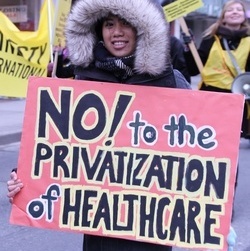 In health care, the speech
pursues the government's approach
of setting so-called concrete goals for
wait times for emergency rooms or to see a doctor, a nurse or a
pharmacist, without specifying how this is to actually be
achieved. This paves the way for the further and accelerated
privatization of the health care system, in the name of
efficiency, which constitutes a huge diversion of health care
funds into the coffers of private monopolies operating under
the narrow aim of making private profit. In its inaugural speech, the
government,
in very cynical fashion, glibly raises the tragic situation in
long-term residential care facilities, from the point of
view of the working conditions of staff as well as the care
provided to those living there. This is all done in order to
promote its Seniors' Homes model based on public-private partnerships
(P3s).
In health care, the speech
pursues the government's approach
of setting so-called concrete goals for
wait times for emergency rooms or to see a doctor, a nurse or a
pharmacist, without specifying how this is to actually be
achieved. This paves the way for the further and accelerated
privatization of the health care system, in the name of
efficiency, which constitutes a huge diversion of health care
funds into the coffers of private monopolies operating under
the narrow aim of making private profit. In its inaugural speech, the
government,
in very cynical fashion, glibly raises the tragic situation in
long-term residential care facilities, from the point of
view of the working conditions of staff as well as the care
provided to those living there. This is all done in order to
promote its Seniors' Homes model based on public-private partnerships
(P3s).
As for the economy, in the name of creating wealth, the speech carries on the neo-liberal mantra of placing all of society's human, material and natural resources at the disposal of big private interests, which supposedly will have a beneficial impact on the people. Not only does the speech repeat that mantra, it pushes it even further. The government shamelessly declares that "the other lever [besides education] for the creation of wealth, is business investment. That it's through business investments that productivity will increase and create better paying jobs." However, it claims, the Ministry of Finance must first change how it does things at Investment Quebec, that it "will have to be a lot more bold."
"The Minister of Economy and Innovation is already at work" reshaping Quebec's investment arm, Investissement Québec, to make it "new, more agile, more voluntary, more ambitious, more enterprising."
All kinds of measures to stimulate private investment through state pay-the-rich schemes follow. These include a tax system that encourages business investment, reduced delays in granting operating permits, a reduced administrative burden on businesses, a supposedly more commercial focus on Quebec's international relations in order to promote Quebec's exports, particularly with regard to the U.S., the transformation of Quebec into a gateway for European companies to North America, etc.
The government does not even feel any responsibility to explain, or even mention, the crises hitting big supranational monopolies like Bombardier, or other companies such as RONA which, having been absorbed into the U.S. empire's Lowe's, has just announced the closure of 27 stores in Canada, including nine in Quebec. The opening speech does not make a single reference to the crises and turmoil that have further damaged Quebec's manufacturing sector, following large investments of public funds in these and other monopolies through state pay-the-rich schemes.
The Legault government is desperate to serve the private oligarchs that control the economy at any cost and to further integrate Quebec into the U.S. empire. Thus, the inaugural speech sets the aim of the Quebec economy to become "the battery of Northeastern America" through hydro-electricity exports, to make it more competitive and so-called greener. Moreover, whenever the environment is evoked in the speech, it is done within a perspective of enriching the monopolies. Any prospect of nation-building that serves the well-being of the people, based on an economy that provides for their needs and trade based on mutual development and benefit, is entirely absent from the perspective put forward in the opening speech.
Amongst other things, the opening speech also mentions that the government intends to introduce a bill in the coming months to prohibit the wearing of so-called religious symbols by persons in positions of authority in the public sector, including teachers, which could lead to the firing of people who refuse to relinquish these symbols. It should be noted that this bill will be tabled as teachers prepare for the next round of public sector negotiations for the renewal of their collective agreements. The government is pursuing its cowardly, divisive and diversionary course to divert Quebeckers from the crucial issues they face with respect to the usurpation of the state by major supranational private interests, not by any religious power.
The speech also provides for continued attacks against immigrants, while claiming to respond to a "legitimate concern" of Quebeckers with regard to immigration, again to divide and divert the people from the real issues and further link immigration to the needs of private monopolies.
Ontario Government's Gratuitous Attack on
Francophone
Minority Rights Condemned
Wide-Scale Defence of Francophone Rights

Ottawa, December 1, 2018.
Condemnation of the Ford government's decision to scrap the building of a French language university and to eliminate the Office of the French Language Commissioner in Ontario, announced as a "cost saving" measure in November, has been swift and widespread throughout the province and Canada. This cynical attack on Francophone Ontarians is an assault on the very nature of a society that Canadians want to have.
On December 1, a Day of
Action was held across Ontario
with participation in more than 40 communities. The
protest was organized by the Assemblée de la francophonie de
l'Ontario, a province-wide organization that defends the rights
and interests of the more than 600,000 Ontarians whose mother
tongue is French. The organizers estimate that close to 15,000
people from all walks of life, including large numbers of
students and youth, took part in the actions in Ontario. Protests
were also held in Manitoba, Saskatchewan, New Brunswick, Quebec
and elsewhere.
In Ottawa, for example, several thousand people rallied outside Ottawa City Hall to demand the Ontario government respect Francophone minority rights and rescind these decisions. The Ottawa Sun quoted Jean-Francois Lacelle of Gatineau as saying, "If we can't respect the rights of Franco-Ontarians or Francophone Canadians, then how can people believe that we're going to respect the rights of any kind of minority in Canada. It's not that we are just protesting for us Francophones. It's about learning to respect all Canadian minorities and learning to give them the respect for their culture." The organized fight to save the Monfort Hospital from closure by the Mike Harris government in the 1990s was frequently cited at the Ottawa action -- reflecting the determination to defeat the Ford government's unilateral anti-social cuts.
And it is not only Francophones speaking out. The Quebec Community Groups Network, a not-for-profit organization that unites 59 English-language community organizations across Quebec, immediately condemned the Ontario government decision. "We stand in solidarity with Ontario's French-speaking community and demand the Ford Government reconsider these blind cuts that will cause severe setbacks for Ontario's French language minority community," said their spokesperson.
The Canadian Association of University Teachers (CAUT) and the Ontario College and University Faculty Association (OCUFA) also issued strong condemnations of the Ford government's attacks. Delegates attending the 85th Canadian Association of University Teachers Council meeting unanimously adopted a motion condemning the cancellation of plans for the Université de l'Ontario français, without even consulting Franco-Ontarians. In a letter to the Premier, CAUT executive director, David Robinson wrote, "We ask you and your government to hold, with respect to the linguistic rights of minorities, consultations with all the relevant stakeholders, and most importantly, with the Francophone community of Ontario, before making a final decision on the future of a French university in Ontario."
The OCUFA
noted
that the French language university was conceived as an
autonomous institution that would be created by and for
Francophones, to serve central and southwestern Ontario, home to
the fastest growing population of Francophones in the province.
In a statement, OCUFA noted: "It is deeply concerning that this
government would cancel the promised French-language university
without first consulting Francophone students, parents, and
faculty. The decision marks a distinct lack of respect for
Ontario's minority French-speaking population, and Francophones
are justified in their frustration . . . Faculty across Ontario
are alarmed that the government continues to make decisions of
this magnitude behind closed doors in secret. The cancelled
French-language university is further evidence that the Doug Ford
government is not interested in listening to Ontarians, but is
instead committed to pursuing an uninformed and unaccountable
ideological agenda."
Hawkesbury municipal council unanimously passed a resolution on November 26 denouncing the Ford government decision and stating that the town of Hawkesbury firmly defends the rights of French-speaking Ontario residents and wants to play an active role in defending those rights. The media reports that Canadian Parents for French, a Canada-wide network, condemned the Ford government's decision and French Catholic school boards across Ontario have also joined the protests over the decision to cancel a French-language university in southern Ontario. Ontario has eight French Catholic school boards with about 75,000 students. Ford's move, they say, punishes Ontario's most successful school system (93 per cent graduation rates and the highest scores of any Ontario public school board on standardized tests) by devaluing its high school diplomas. Existing bilingual programs, such as those at the University of Ottawa, University of Sudbury and Saint Paul University are "linguistically incomplete" they add, forcing students to take some courses in English to complete their degrees.
The Canadian Federation of Students-Ontario has also come out in opposition to the Ford government cuts. Nour Alideeb, chairperson of CFS-Ontario said, "Creating this French-language university was necessary to improve the quality of education for the 600,000 Francophones living across this province." Ford's government, she said, has essentially wasted decades of funding and consultations that had been building towards this project.
Fred Hahn, President of the
Canadian Union of Public
Employees-Ontario, speaking for his union said, "These services
and protections are how French language rights are realized in
our province. This decision by Ford's government is outrageous to
not only the over 600,000 Franco-Ontarians who deserve the
respect of our government, but to all Ontarians and Canadians who
value language diversity."
As well, one of the only two Francophone MPPs in the current Ontario Conservative government caucus, Amanda Simard, representing the Glengarry-Prescott-Russell riding, resigned from the government caucus and is now sitting as an independent in the legislature. She said that she was repeatedly ignored and shut out in her attempts to represent her constituency where many Francophones reside and to dissuade the government from pursuing this attack on Francophone minority rights in Ontario.
In the wake of the resistance, Premier Ford tried to undermine the opposition. While continuing to insist that the French language university is not going to be built, the Premier floated a proposal to replace the Office of French Language Commissioner in Ontario with a French language services commissioner, attached to the ombudsman's office and to hire a senior policy adviser responsible for Francophone affairs in the Premier's office. But this too has been denounced as unacceptable as it would downgrade the position of the French Language Commissioner from one that advocates for French language rights and services in the province to a lesser role of receiving complaints within the Ombudsman's Office.
Bill 57, the Restoring Trust, Transparency and Accountability Act, introduced on November 15, under Schedule 20, calls for the elimination of the French Language Services Commissioner and "related matters." On December 3, appearing before the government's Standing Committee on Economic Affairs, which is discussing Bill 57, Commissioner Francois Boileau noted:
Without an independent commissioner that can launch proactive investigations and studies, the community may suffer from further indifference to their challenges and encroachment of their rights. Eliminating the independent Office of the French Language Services Commissioner will save tax payers maybe less than $300,000. But what we are losing, what the Franco-Ontarians and the general public are losing, is the voice of an expert and cost-effective advisor.
This is an important issue for all Canadians. For Ontario Premier Ford and the financial oligarchs at home and abroad (even the Washington Post is carrying op eds hailing Ford for daring to do away with "the sacred cow of Francophone rights" in the name of austerity) society exists to further the interests of the financial oligarchs who increasingly dominate political life in our country and get to define what rights are recognized in Canada, which is not what Canadians want. Canadians want their rights and the rights of all respected and defended by government.
December 1 Day of Action

Ottawa
Highway 11
Temiscaming Shores
Sudbury
North Bay

New Liskeard
Greenstone

Timmins


Elliot Lake

Blind River
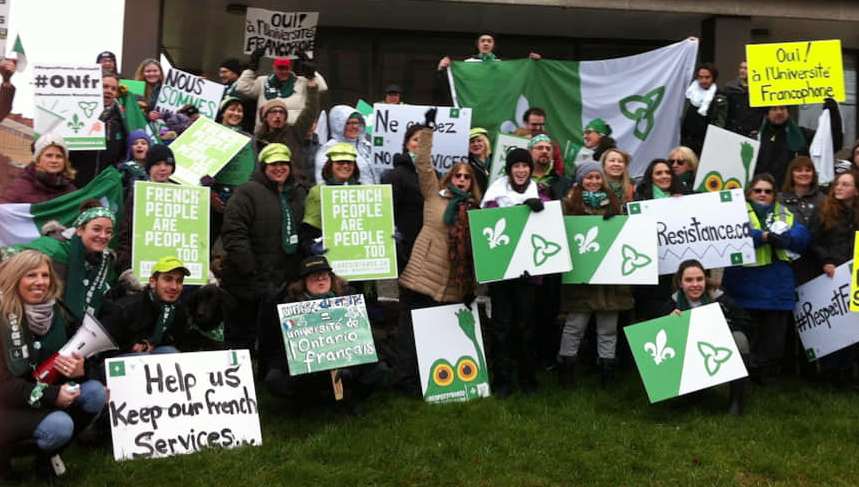
Sault Ste. Marie


Marathon; Kapuskasing


Thunder Bay



Essex

St. Boniface, Manitoba
(With files from CBC, Globe and Mail, Toronto Star, Montreal Gazette, Ottawa Sun, www.ola.org, Office of the French Language Commissioner. Photos: TML, AEFO.)
BC Referendum on Electoral Reform
Voting Concludes in Referendum on
Proportional
Representation
Voting has concluded in the British Columbia referendum on whether to adopt Proportional Representation (PR) or stay with the First Past the Post (FPTP) voting system. Of the 3,297,395 registered voters in the province, a little over 40 per cent cast a ballot. The results of the mail-in vote are expected before Christmas.
According to spokespersons from the No side, who repeatedly complained about a possible low voter turnout and subsequent invalid result, a 40 per cent level of participation would "legitimize" the referendum, a threshold which appears to have been reached. However, other complaints are likely forthcoming.
The last mail-in referendum in BC was the Treaty Rights referendum in 2002, conducted by the BC Liberal government, in which 35 per cent of registered voters participated. Three other referendums have been held in the last 18 years. However, these were not mail-in ballots but rather were held in conjunction with provincial elections. The 2005 and 2009 referendums on whether to adopt the Single Transferable Vote system resulted in participation by 61 per cent and 48 per cent of registered voters respectively, while the 2011 referendum on the Harmonized Sales Tax (HST) had 52 per cent.
In the current referendum, the difference between the
organizing campaigns of the Yes and No sides was significant. The
Yes side relied mainly on grass roots organizing, such as public
meetings, literature tables, leaflet distribution, door-to-door
and phone canvasses, and other activities in communities. On the
other hand, the No side relied heavily on the monopoly media to
engage in a campaign of fearmongering, disinformation and
outright lies, as well as anti-PR ads financed by big business
interests.

Meeting in Quesnel, November 1, 2018, one of many organized for people
to inform themselves
on and discuss the BC referendum.
In the course of the campaign, the activists of the Yes side worked hard to promote serious discussion amongst British Columbians about PR and the three options being presented. This was despite the negative atmosphere created by No side proponents and the monopoly media.
All kinds of speculation is taking place on why people have voted for one side or the other or not at all. A recent poll purports to show that the main reason why people voted to stay with FPTP was that they found the three PR options being presented to be "confusing." This problem was confirmed by Yes side activists who found that once the PR options were clearly explained in meetings and other venues that many people were convinced to give up on FPTP and shift their support to PR. Adopting PR is not considered to be a hard task in British Columbia given the longstanding striving of British Columbians for electoral reform, thwarted each time by measures taken by those in power to impede a Yes vote. All of it distracts attention from the fact that the people need to become an independent political force which takes stands on all matters that favour them. In this referendum, the limited engagement and education process put in place by the provincial government has made the work of PR advocates a difficult task. Given the difficulties, they are a real credit to the people's striving for empowerment.
Indeed, the cartel parties in the Legislatures and Parliaments of Canada have a history of making it difficult for citizens to initiate and bring about reform and renewal of the democratic process, especially any measures which grant more power to the citizenry. For one thing, they put in place processes that automatically divide people into "Yes" and "No" camps. For another, instead of establishing permanent, mandatory mechanisms that empower the citizenry, the parties persist in utilizing entirely arbitrary processes that favour their interests and those of the financial elite, which balks at the citizenry having anything to do with changing the electoral system.
No matter what reasoning they give to justify their stalling and impediments, it just brings their system called democratic and representative into further disrepute.
Under current practices, whichever party is in power has free rein to use whatever process it wants in conducting an electoral reform referendum. In the 2005 and 2009 referendums on whether to adopt the Single Transferable Vote system, the BC Liberal government used a Citizens' Assembly model, but set the bar very high (60 per cent) for approval. More recently, the NDP government conducted an engagement and education process for the PR referendum, which many felt was half-hearted and lacking.
This arbitrariness by the cartel parties is especially shown by the way Recall and Initiative legislation has been handled over the years. This legislation, which allows voters to recall MLAs and launch legislative initiatives, shifts some power in certain narrow areas to the citizenry. In 1991, over 80 per cent of British Columbians enthusiastically voted for this legislation. Yet the main parties in the Legislature (NDP and Liberals) collaborated to make the Recall and Initiative legislation extremely difficult for people to utilize.
 This continues today. For
example, the BC NDP government has
recently brought in further amendments to the Recall legislation
making it even harder for citizens to utilize. For its part, the
Liberal opposition is raising objections but from a similar
self-serving vantage point.
This continues today. For
example, the BC NDP government has
recently brought in further amendments to the Recall legislation
making it even harder for citizens to utilize. For its part, the
Liberal opposition is raising objections but from a similar
self-serving vantage point.
All of this underscores the fact that the overall system of what is called "representative democracy" does not vest sovereign, decision-making power in the people but rather concentrates it in the hands of political parties which pay the rich, as can be seen in the shenanigans related to the various electoral reform referendums in the province.
Despite these many obstacles, it is to the credit of people across the province that they have come forward and fought hard to bring about PR. Whatever the outcome of the referendum, this work is important and part of the striving of British Columbians for democratic renewal and for a political process that empowers them and puts decision-making power in their hands.
International Day of Solidarity with the Palestinian People
Commemoration Affirms the Rights
of the Palestinian People
On December 1, the Canadian Palestinian Council and the Arab Palestinian Association commemorated the International Day of Solidarity with the Palestinian People at the Versailles Convention Centre in Mississauga, Ontario. More than 250 people, some coming long distances, took part in the political and social event, which included poems, songs and speeches, with a keynote speech by the Roving Ambassador for Palestinian Missions, His Excellency Afif Safief.
Founder and leader of the Canadian Palestinian Council Rashad Saleh welcomed everyone and highlighted the importance of the International Day of Solidarity with the Palestinian People as an occasion for the Palestinian people and their friends to gather in Palestine and abroad to share their thoughts and strengthen their collective resolve to liberate and reclaim their homeland.
Anna Di Carlo, the National Leader of the Marxist-Leninist Party of Canada brought the greetings of the Party. She pointed out that the Party, since its founding in 1970, has stood with the Palestinian people. She said the Canadian people have stood with the Palestinian people in their resistance to the Israeli Zionist state along with all enlightened humanity. She emphasized that the Canadian people would very much like to see the Trudeau Liberals take a principled stand to support the just struggle of the Palestinian people and expressed her and the Party's conviction that the heroic Palestinian people's struggle will be victorious.
Rabbi Yisroel Dovid Weiss of the Jews United Against Zionism spoke of the ancient, long-standing peaceful brotherhood of the Jewish and Palestinian people. He stressed the determined support of the Jewish community for the restoration of the rights of the Palestinian people and the return of their homeland.
Nour El-Kadri, President of the Canadian Arab Federation, and Professor Ziad Malawi Freihat, President of the Jordanian Canadian Society, also spoke and affirmed support for the Palestinian people.
Omar Alghabra, Liberal MP for Mississauga Centre and Iqra Khalid, Liberal MP for Mississauga-Erin Mills brought greetings.
Abdi Hagi Yusuf, Secretary-Treasurer of CUPW-Toronto, said CUPW was one of three unions in Canada who support the Palestinians and their human rights and that the Union will continue to stand with the Palestinian people.
McMaster University professor Dr. Atif Kubursi opposed the attempts to push the question of Palestine out of centre stage. He pointed out that peace and human rights are indivisible and called for an end to the Israeli occupation.
The keynote speaker, Ambassador Afif Safieh, highlighted the resistance and resilience of the Palestinian people, particularly since the resurgence of the national movement in 1965. He pointed out that the Nakba, in which the Palestinian people were forced off their lands and properties by Zionist terrorists, backed by the U.S. and others, did not end in 1948 but remains ongoing, with the illegal seizure of Palestinian lands and property by the current Israeli state. Ambassador Safieh called on the Palestinians in the diaspora to step up their support for the Palestinians and play their role in this historic fight.
A warm and festive atmosphere prevailed during the function. A dinner was served, followed by a cultural program of Palestinian poetry, music and dance. The organizers expressed their deep satisfaction at the success of the event. Throughout the informal program, people discussed at their tables how to support the Palestinian people.
Death of a War Criminal
Setting the Record Straight on George H.W. Bush
George Herbert Walker Bush, June 12, 1924 -- November 30, 2018
- 10th U.S. Ambassador to the United Nations 1973-1974
- 2nd
Chief of the U.S. Liaison Office to China 1974-1975
- Director of
the CIA 1976-1977
- 43rd Vice President of the United States
1981-1989
- 41st President of the United States 1989-1993
Since George Herbert Walker Bush passed away on November 30, 2018, accolades are being sung to his public service, his role in allegedly bringing democracy to the whole world, and his leadership in the supposedly just Gulf War. Let us set the record straight.
|
|
George Bush Sr. was the leading figure in carrying out the most heinous crimes of U.S. imperialism against the peoples of the world, first as Director of the CIA and then as vice president and president of the U.S. He was a leading figure in the Chilean coup against President Salvador Allende and bears direct responsibility for the death through torture of thousands of Chilean people, as well as the disappearance of thousands of others. He was an architect of the Contra War against Nicaragua, the dirty wars in Guatemala and El Salvador, the invasion of Panama, the invasion of Grenada, the first Gulf War and terrorist activities against Cuba, not to mention his activities in shaping the counter-revolutions in the former Soviet Union and the countries of eastern Europe and many others.
Bush was president at a time the bi-polar division of the world -- the division between the Soviet and American blocs -- had just ended, but it did not follow that the strivings of the big powers for world domination also ended. Instead, the redivision of the world into new spheres of influence began once again. The crisis in the Gulf region was the first example of this following the end of the bi-polar division of the world. The U.S. has strategic interests in the Gulf region. At that time, it wanted not only to preserve its influence there but also to extend it. Iraq wanted this region to be its own zone of influence and toward this end wanted to establish itself as the dominant power in the region with whom others would have to negotiate the fate of the region. Germany, France, Japan and others also have interests in the region, as did the former Soviet Union, replaced by the Russian Federation. In other words, the clash of interests there in no way ended with the end of the bi-polar division of the world.
This period also signaled the end of war as politics
by
other means. No longer could the big powers sort out their
conflicts over who would dominate the world on the basis of
methods used in the past. Under the presidency of George H.W.
Bush, as private interests, in the form of conglomerates involved
in war production and dominating energy and other markets, became
politicized, they sought to impose their hegemony. Failing to
achieve their aim through voluntary submission, war became an act
of wanton destruction. Witness the invasion of Iraq under the
guise of protecting Kuwait and safeguarding democracy. Since that time,
the imperialist notions of human rights and democracy which have been
imposed directly contradict human experience and violate human
conscience.
George H.W. Bush was an arch-criminal and enemy of the peoples of the world. That is the truth of the matter.
Excerpt from "The Ignored Legacy of George H.W. Bush:
War
Crimes, Racism, and Obstruction of Justice," Mehdi Hasan,
The
Intercept, December 1, 2018
[...]
The first Gulf War, as an investigation by journalist Joshua Holland concluded, "was sold on a mountain of war propaganda."
For a start, Bush told the American public that Iraq had invaded Kuwait "without provocation or warning." What he omitted to mention was that the U.S. ambassador to Iraq, April Glaspie, had given an effective green light to Saddam Hussein, telling him in July 1990, a week before his invasion, "[W]e have no opinion on the Arab-Arab conflicts, like your border disagreement with Kuwait."
Then there is the fabrication of intelligence. Bush deployed U.S. troops to the Gulf in August 1990 and claimed that he was doing so in order "to assist the Saudi Arabian Government in the defence of its homeland." As Scott Peterson wrote in the Christian Science Monitor in 2002, "Citing top-secret satellite images, Pentagon officials estimated ... that up to 250,000 Iraqi troops and 1,500 tanks stood on the border, threatening the key U.S. oil supplier."
Yet when reporter Jean Heller of the St. Petersburg Times acquired her own commercial satellite images of the Saudi border, she found no signs of Iraqi forces; only an empty desert. "It was a pretty serious fib," Heller told Peterson, adding: "That [Iraqi buildup] was the whole justification for Bush sending troops in there, and it just didn't exist."

Demonstration in San Francisco in 1991 against the First Gulf War.
He committed war crimes. Under Bush Sr., the U.S. dropped a whopping 88,500 tons of bombs on Iraq and Iraqi-occupied Kuwait, many of which resulted in horrific civilian casualties. In February 1991, for example, a U.S. airstrike on an air-raid shelter in the Amiriyah neighbourhood of Baghdad killed at least 408 Iraqi civilians. According to Human Rights Watch, the Pentagon knew the Amiriyah facility had been used as a civil defence shelter during the Iran-Iraq war and yet had attacked without warning. It was, concluded [Human Rights Watch], "a serious violation of the laws of war."
U.S. bombs also destroyed essential Iraqi civilian infrastructure -- from electricity-generating and water-treatment facilities to food-processing plants and flour mills. This was no accident. As Barton Gellman of the Washington Post reported in June 1991: "Some targets, especially late in the war, were bombed primarily to create postwar leverage over Iraq, not to influence the course of the conflict itself. Planners now say their intent was to destroy or damage valuable facilities that Baghdad could not repair without foreign assistance. ... Because of these goals, damage to civilian structures and interests, invariably described by briefers during the war as 'collateral' and unintended, was sometimes neither."
Got that? The Bush administration deliberately targeted civilian infrastructure for "leverage" over Saddam Hussein. How is this not terrorism? As a Harvard public health team concluded in June 1991, less than four months after the end of the war, the destruction of Iraqi infrastructure had resulted in acute malnutrition and "epidemic" levels of cholera and typhoid.
By January 1992, Beth Osborne Daponte, a demographer with the U.S. Census Bureau, was estimating that Bush's Gulf War had caused the deaths of 158,000 Iraqis, including 13,000 immediate civilian deaths and 70,000 deaths from the damage done to electricity and sewage treatment plants. Daponte's numbers contradicted the Bush administration's, and she was threatened by her superiors with dismissal for releasing "false information." (Sound familiar?)
[Bush] refused to cooperate with a special counsel. The Iran-Contra affair, in which the United States traded missiles for Americans hostages in Iran, and used the proceeds of those arms sales to fund Contra rebels in Nicaragua, did much to undermine the presidency of Ronald Reagan. Yet his vice president's involvement in that controversial affair has garnered far less attention. "The criminal investigation of Bush was regrettably incomplete," wrote Special Counsel Lawrence Walsh, a former deputy attorney general in the Eisenhower administration, in his final report on the Iran-Contra affair in August 1993.
Why? Because Bush, who was "fully aware of the Iran arms sale," according to the special counsel, failed to hand over a diary "containing contemporaneous notes relevant to Iran/contra" and refused to be interviewed in the later stages of the investigation. In the final days of his presidency, Bush even issued pardons to six defendants in the Iran-Contra affair, including former Defense Secretary Caspar Weinberger -- on the eve of Weinberger's trial for perjury and obstruction of justice. "The Weinberger pardon," Walsh pointedly noted, "marked the first time a president ever pardoned someone in whose trial he might have been called as a witness, because the president was knowledgeable of factual events underlying the case." An angry Walsh accused Bush of "misconduct" and helping to complete "the Iran-contra cover-up."
Sounds like a Trumpian case of obstruction of justice, doesn't it?
He escalated the racist war on drugs. In September 1989, in a televised address to the nation from the Oval Office, Bush held up a bag of crack cocaine, which he said had been "seized a few days ago in a park across the street from the White House. ... It could easily have been heroin or PCP."
Yet a Washington Post investigation later that month revealed that federal agents had "lured" the drug dealer to Lafayette Park so that they could make an "undercover crack buy in a park better known for its location across Pennsylvania Avenue from the White House than for illegal drug activity" (the dealer didn't know where the White House was and even asked the agents for directions). Bush cynically used this prop -- the bag of crack -- to call for a $1.5 billion increase in spending on the drug war, declaiming: "We need more prisons, more jails, more courts, more prosecutors."
The result? "Millions of Americans were incarcerated, hundreds of billions of dollars wasted, and hundreds of thousands of human beings allowed to die of AIDS -- all in the name of a 'war on drugs' that did nothing to reduce drug abuse," pointed out Ethan Nadelmann, founder of the Drug Policy Alliance, in 2014. Bush, he argued, "put ideology and politics above science and health." Today, even leading Republicans, such as Chris Christie and Rand Paul, agree that the war on drugs, ramped up by Bush during his four years in the White House, has been a dismal and racist failure.
He groped women. Since the start of the #MeToo movement, in late 2017, at least eight different women have come forward with claims that the former president groped them, in most cases while they were posing for photos with him. One of them, Roslyn Corrigan, told Time magazine that Bush had touched her inappropriately in 2003, when she was just 16. "I was a child," she said. The former president was 79. Bush's spokesperson offered this defence of his boss in October 2017: "At age 93, President Bush has been confined to a wheelchair for roughly five years, so his arm falls on the lower waist of people with whom he takes pictures." Yet, as Time noted, "Bush was standing upright in 2003 when he met Corrigan."
Facts matter. The 41st president of the United States was not the last Republican moderate or a throwback to an imagined age of conservative decency and civility; he engaged in race baiting, obstruction of justice, and war crimes. He had much more in common with the two Republican presidents who came after him than his current crop of fans would like us to believe.
From the Party Press
U.S., Iraq and the Danger of War in the Gulf
It is over five months now since Iraq invaded Kuwait on August 2, 1990 and subsequently annexed it. During the same period of time the U.S., Canada, Britain and some others, but especially the U.S., have created an intense war hysteria. War is being presented as the ultimate means to right the wrong done. January 15 has been set by George Bush as the date after which he could do whatever he wishes, including unleashing a war to throw the Iraqis out of Kuwait and to smash the Iraqi military power.
The invasion and annexation of Kuwait have been universally condemned by world public opinion. But that is where the similarity of attitudes ends. The big powers are using this situation for their own aggressive ends. The U.S., which has long wanted to station its forces on Arab soil, has now achieved its ambition, at least for the time being. With the forces in place and the stamp of approval of the U.N. Security Council behind it, the U.S. can now demand anything it desires, including the savage destruction of the whole region. The question really arises: Is George Bush for peace and the democratization of international life, or for world domination? The answer is that the U.S. and George Bush are for the democratization of international life so long as it serves their interests. They manipulated the discontent in Eastern Europe towards their own ends. They are trying to manipulate world public opinion against the Iraqi invasion and annexation of Kuwait for the same ends.
Right after the invasion of Kuwait, the issue arose: Is war the answer? George Bush immediately said yes, and began deploying U.S. forces into Saudi Arabia and the region. It was argued that the invasion of Saudi Arabia was an imminent possibility and that Iraq must be stopped. Others spoke in a different manner. The Soviet Union spoke of peace, as did France, and they talked about the use of economic sanctions. But none of them spoke against George Bush, who started pushing for war against Iraq right from the outset. They all claim to be united against the Iraqi invasion and annexation of Kuwait.
It has become extremely clear that all the big powers are playing their politics and serving their own interests. A massive diplomatic machine has been set in motion in order to achieve those ends. George Bush wants to dominate the Gulf region and the world, and this is what is motivating him to push for war. France, Germany and Japan cannot openly oppose the U.S., though their interests differ. They do not want the U.S. to succeed in destroying Saddam Hussein. The Soviet Union cannot agree to have no influence in the region either. In other words, the conflict in the Middle East has again been transformed into a conflict between the big powers, as has been the case for decades. Each big power is now rushing to safeguard its own interests as the situation in the region becomes increasingly tense. If the big powers ever united in the past, or if they should unite now, it would only be because the peoples threatened their interests. The declaration in Paris that the Cold War has ended has only fuelled the deep-going collisions of course which their conflicting interests dictate.
There is big talk about defending democracy, fighting aggression, etc. But, as the facts themselves reveal, the use of these high-sounding phrases is not for purposes of defending high ideals but to achieve something else. For example, the facts themselves speak about the intentions of the U.S. With the collapse of the regimes in Eastern Europe and the re-unification of Germany, the American influence in Europe is a passing one. The European Community is emerging as an economic and political power which the U.S. will have to reckon with. But the U.S. is still a military power. It does not want anyone to forget this. It wants to be the world gendarme which is paid for services rendered.
Saddam Hussein carried out the invasion of Kuwait for his own ends of defending the Iraqi economy and challenging the power of the oil sheiks and the Emir of Kuwait, who were egged on by the U.S. to destroy the Iraqi economy. Iraq wants to be the dominant power in the Middle East in order to emerge as an economic and political power in its own right and organize the Arabs against others from inside and outside the region. But Iraq has now become a chip on the bargaining table of the big powers. Saddam Hussein has destabilized the international situation, giving all the big powers the opportunity to push for their own interests and redivide the world among themselves. When the U.S. organizes for war, it is not only seeking to defeat Iraq but to also get the upper hand over all the other powers who have an interest in the region and the world. George Bush is only for George Bush and he knows how to serve the U.S. interests in any region of the world, including the Gulf region. George Bush goes out of his way to emphasize that he not only wants Iraq out of Kuwait but also that the Iraqi military power must be smashed. In this manner, the U.S. will lay claim not only to being the champion of the highest of morals, but also the dominant military power in the Middle East.
Saddam Hussein speaks of linking the Palestinian question with the occupation of Kuwait. But this linkage is a multi-edged sword, and one of the edges is Iraq's desire to be recognized as the dominant power in the Middle East with whom others could negotiate. Iraq wants the Palestinian question to be a bargaining chip. The Iraqis also speak of all the suffering and the conflicts outsiders have caused in the Middle East. Will the U.S. agree with this? No. Secretary of State James Baker stated emphatically that he was not negotiating with Iraq in Geneva. He had gone to Geneva only to tell the Iraqis that the U.S. was serious about crushing them. Will France, Germany or Japan agree with the smashing of Saddam Hussein? Will the Soviet Union agree? These are the questions which point to a very grave situation, with the interests of the big powers now being at the centre of the conflict.
The Mulroney government believes that the Canadian interest is served by the U.S. remaining a dominant power. This is the only reason why the Canadian government is pushing the war hysteria. This is a dangerous position which commits Canada to all American military operations, under the supposition that so long as the U.S. is the world gendarme, it will be good for Canada.
The rise of this conflict also has another dimension: that is, the push for real democratization of international life, the opposition to all the big power politics and the designs of the big powers for world domination. We must take advantage of the situation and oppose not only the Iraqi invasion and annexation of Kuwait but also the U.S. drive for domination in the Middle East. We must oppose the Israelis for siding with the U.S., and likewise the Egyptians, Syrians, Saudis, etc. But we must also call upon the Palestinians, Jordanians and others not to side with Iraq. We must create a new world order where the condition for the peace and prosperity of any nation or people is the peace and prosperity of all nations and peoples.
The just position at this time can only be:
1. No to the U.S. or any other foreign military presence in the Middle East! This also means No to the Canadian military presence in the Gulf region!
2. No to Iraq's invasion and annexation of Kuwait!
3. No sale of military weapons or any form of military aid to anyone in the Middle East region!
In conclusion, we must demand that the Canadian government must not make decisions which increase the danger of war in any region of the world. The democratization of life in Canada will contribute to the democratization of life internationally. People have the right to overthrow any government which leads them into unjust wars.
The Use of Force
Right from the time the U.S. launched the Gulf War following the end of the bi-polar division of the world, it became clear that it wanted to have a monopoly over force and its use. The administration of George Bush Senior set out to establish "a new world order" in which the United States of America was to be the sole country which owns and controls this massive killing power, to be released according to the inclinations of the President of the United States.
Had force not been used at the time of the Persian Gulf Conflict by the United States and the international coalition which lined up behind it, the peoples would have had initiative in their hands. But the United States and the big powers assumed that the peoples of the world were a non-factor; a non-entity in their own liberation, in the striving to establish a just and peaceful solution to the terrible problems they faced.
This is a mistake. The peoples are the decisive factor which must be brought into play as they have been doing in the period since the Gulf War. It is this decisive factor which the U.S., Canada and other big powers are once again trying to side-line so that it is not effective. Not only does experience show that since 1990, the use of force solved nothing and made the problems much worse, leading from one disaster to the next, but it has shown that the peoples are capable of finding the ways to make themselves an effective force to provide the problems with solutions which favour them.
Repeated use of force by the United States has not sorted any problem out. It has not even maintained the unity of its international coalition because of the competing interests within its ranks. Now, the U.S.'s monopoly over force and its use has been challenged in the worst possible way. Instead of learning the lessons of history, once again, the U.S. is bullying an international coalition to come to its rescue, this time to wipe out terrorism. Once again, force is to be used as the method.
What will be the outcome? We can predict the outcome, perhaps not in all its fine detail but certainly in terms of its general features. Our power to predict tells us that the disasters which lie ahead must be averted. They can be averted and must be averted and the peoples of the world can do it on the basis of the stand which opposes the use of force to settle conflicts between peoples and nations.
Contradictions in Europe Continue to Deepen
Opposition to Britain's Brexit Deal
and Political Chaos
On November 25, a special European Union (EU) summit of the European Council approved the draft withdrawal agreement and future relationship plan struck between Britain and the European Commission, finally ironed out the previous day by Theresa May and the EU Commission president, Jean-Claude Juncker.
 The House of Commons vote
on the Deal is set for December 11, although Theresa May is being urged
by those senior figures who remain loyal to her to postpone the vote to
avoid a crushing defeat, with up to 100 Tory MPs adding to the
opposition, and the possible fall of the government. All predictions
are that Theresa May will be defeated after five days of Parliamentary
debate, but May -- not known for her tactical acumen -- has been
appealing to the people over the heads of MPs, as it is put, and is
certainly seeking to make behind-the-scenes deals so that the
Parliamentary arithmetic adds up. "It is a deal for a brighter future,
which enables us to seize the opportunities which lie ahead," she wrote
in a "letter to the nation," apparently without irony. "Ploughing on is
not stoic," Jeremy Corbyn retorted in Parliament. "It is an act of
national self-harm." If the Withdrawal Agreement is voted down, then
the crisis and political chaos can only increase. EU leaders have
insisted that the Deal can now not be re-negotiated. Those leaders who
have invested in the "European project" do not want to encourage other
nations to break up the European Union further.
The House of Commons vote
on the Deal is set for December 11, although Theresa May is being urged
by those senior figures who remain loyal to her to postpone the vote to
avoid a crushing defeat, with up to 100 Tory MPs adding to the
opposition, and the possible fall of the government. All predictions
are that Theresa May will be defeated after five days of Parliamentary
debate, but May -- not known for her tactical acumen -- has been
appealing to the people over the heads of MPs, as it is put, and is
certainly seeking to make behind-the-scenes deals so that the
Parliamentary arithmetic adds up. "It is a deal for a brighter future,
which enables us to seize the opportunities which lie ahead," she wrote
in a "letter to the nation," apparently without irony. "Ploughing on is
not stoic," Jeremy Corbyn retorted in Parliament. "It is an act of
national self-harm." If the Withdrawal Agreement is voted down, then
the crisis and political chaos can only increase. EU leaders have
insisted that the Deal can now not be re-negotiated. Those leaders who
have invested in the "European project" do not want to encourage other
nations to break up the European Union further.
The Brexit agreement has been brokered by Theresa May with the leaders of the European Union in the context of trade wars, the rampaging of global oligopolies, and the opposition of working people to the imposition of austerity and denial of their rights. The European Union is itself a supranational body serving the interests of global monopolies, but riven with crisis and contradictions. These contradictions are not only between Germany and France, for example, but the measures that the EU is imposing or seeking to impose on Greece, Italy and others, and the opposition to centralized EU decision-making from the northern EU states of Denmark, Estonia, Finland, Ireland, Latvia, Lithuania, the Netherlands, and Sweden. Furthermore, protests against austerity are once again erupting in France and elsewhere. There is also the issue of the push by France and Germany for a European Army, and whether this should have the same or different aims from NATO.
An apocalyptic vision of a "no-deal Brexit" is being given to justify siding with the Withdrawal Agreement, the text of which has been opposed by virtually all the political players in Britain, and has itself led to the resignation of seven government ministers at the last count.
The opposition to remaining within the EU in the 2016 referendum was said to come for various reasons, but it can be certain that opposition to the anti-social offensive was a major cause. The majority for Leave, of course, was not what was supposed to happen or why David Cameron called the Referendum, which was not to resolve any problem facing society or the economy, but for self-serving and self-deluding reasons. Far from resolving problems, it led to the resignation of Cameron, to further splitting of the polity between Remainers and Brexiteers, and was used as a pretext for increasing racism and chauvinism organized by the state, to further divert from the people getting organized to solve the deep-seated problems of society and the economy. The mantra of "taking back control" has been seen to be a cruel joke, as working people are being encouraged to be nothing more than spectators to the Westminster shenanigans.
It is certain that Brexit or no Brexit, the people are not going to benefit from the outcome. Theresa May has steered Britain into a cul-de-sac with talk of No Deal is better than a Bad Deal, and her conviction that she and Britain can have their cake and eat it too.
Whether in or out of the EU, trade deals are not being struck for the benefit of the people. Indeed, international trade dominated by the big powers and the oligarchs who have no respect for the needs of the people is itself a form of warmongering. Britain with its colonial past and its blatant intervention, including military aggression, in the affairs of other countries, cannot speak of a "sovereign economy" with a straight face in these circumstances. Private interests are in fact paramount. Whether it is the City as a global financial centre, or the war industries, they are being run for private interests with the merest veneer of benefiting the economy.
Furthermore, it is also a farce to speak of a "sovereign economy" and "taking back control" when the rights of the peoples of Scotland and Wales, not to speak of Ireland as a whole, are being ignored. As many have pointed out, in the 585-page document there is not a single mention of Wales and Scotland and what this means even in terms of devolution, let alone the right to self-determination. And of course the issue of the north of Ireland is one of the most fraught. The "backstop" on which the EU negotiators insisted is an attempt to square the circle of how the annexed six counties of Ireland can be in the "United Kingdom," while maintaining its progress towards the day when the people of the whole island of Ireland will determine its future.
When it is posed that the issue is one of "taking back control," it is indeed the working people who are marginalized and disempowered.
It cannot be said that it is
the European Parliament or the European
Commission or European
Court of Justice that is depriving the people of power. The issue can
be posed as to who is
now controlling the British state and who is going to control it. The
sights of the working
people cannot just be set on removing Britain from the alleged control
of Brussels, or of
Germany, or of the European Central Bank.
Rather, it must be recognized that it is not only the European Parliament that has not functioned in the interests of the people, not just in Britain but throughout the EU. Neither, most crucially, has the House of Commons, the system of representative democracy in this country. This is both a question of what is going on behind the scenes, as it were -- the activities of the international financial oligarchy, the Bilderberg Group, the Davos Forum, the control of the economy by international cartels or conglomerates. It is also a question of who or what is represented in this system of representative democracy in Britain.
"Representative democracy" suggests on the face of it that it is the people. But it cannot be said that this is the case, otherwise the people would be not be raising the call, "not in our name." The reality suggests that what is represented is in fact the Crown, the police powers and their exercise, in short the person of state.
To turn things around, the people cannot be spectators to the unfolding crisis. Indeed, the constant posing of the Brexit/Remain division is meant to deprive the people of their own outlook, which is that no problem is going to be sorted out without their own political empowerment. In other words, the people must set their own line of march, and not be content to line up behind "solutions" which in fact do not present solutions to the crisis. The ruling elite have shown that despite the repeated calls of the people, they are not going to change course, and that it is the people's own work that is going to present a way out of the crisis which favours their own interests.
The conclusion to be drawn may well be that what is required is not simply a break with the European Union, but a break with the kind of state that Britain has, along with the big powers of Europe, the "old Europe" of France and Germany, who are colluding and contending for the interests of their own persons of state and rule by exception. To maintain otherwise is to get bogged down in the crisis of Brexit, deal or no-deal. The working people must play their role, organizing themselves for their own political empowerment.
Workers' Weekly is a publication of the Revolutionary Communist Party of Britain (Marxist-Leninist).
(December 1, 2018)
15th G20 Meeting in Buenos Aires, Argentina
Mass Actions Reject Anti-Social Offensive
and Neo-Liberal
Summit
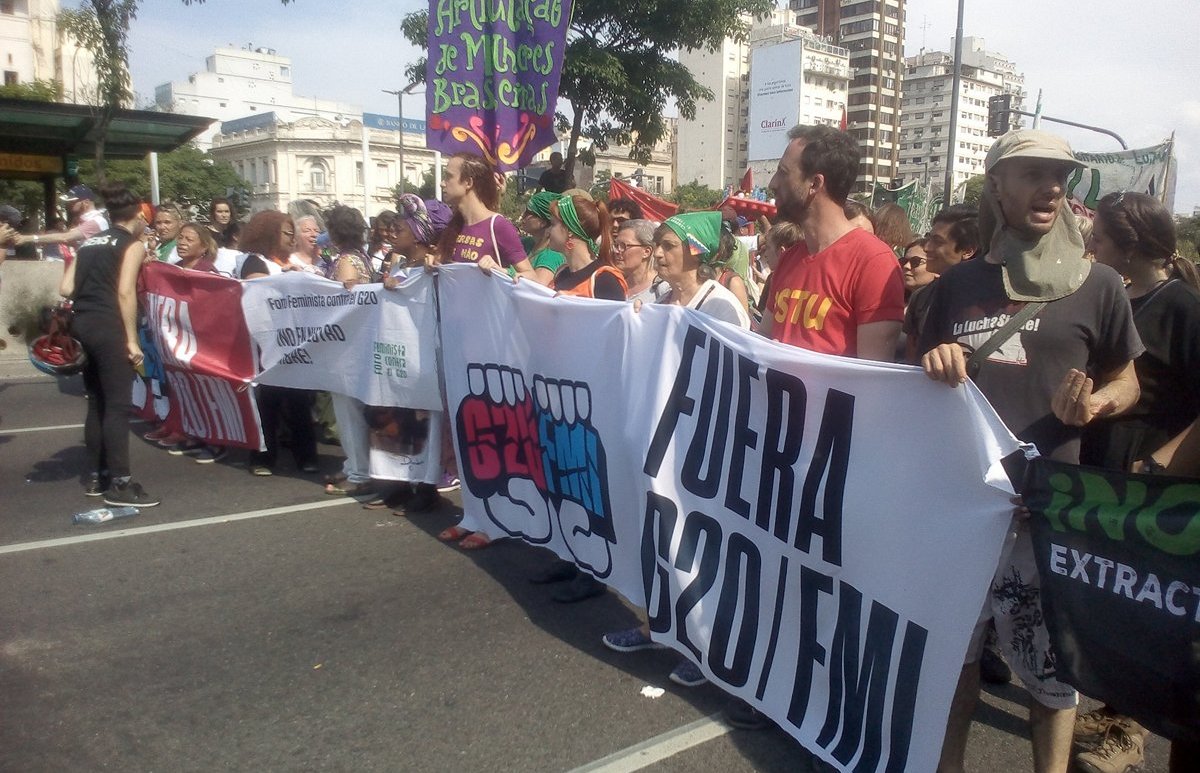
Demonstration against G20 in Buenos Aires, November 30, 2018.
 The 15th summit of the G20
took place in Argentina from
November 30 to December 1. Argentinians, in particular youth and
students, were already in motion to oppose the anti-social
offensive of the Macri government. The presence of the leaders of
the world's largest and wealthiest countries, who give themselves
the right to decide the fate of the world in the name of high
ideals, to the exclusion of its peoples, was soundly rejected by
Argentinians and others who came to Buenos Aires to affirm the
peoples' right to decide and reject the agenda of the G20. The
peoples' exclusion from governance is an established feature of
the G20, and is underscored by the disproportionate security
measures that accompany each summit, aimed at repression and
criminalization of dissent. Activists in Argentina reported that
one-third of the budget for organizing the G20 was dedicated to
"safety and defence," which roughly amounts to U.S.$50 million.
Some 22,000 police were deployed for the summit, with an
additional 5,000 security forces from neighbouring countries, in
addition to the purchase of armoured vehicles and surveillance
equipment. As many point out, these massive
expenditures come as the Argentinian government is making massive
cuts to health care and post-secondary education.
The 15th summit of the G20
took place in Argentina from
November 30 to December 1. Argentinians, in particular youth and
students, were already in motion to oppose the anti-social
offensive of the Macri government. The presence of the leaders of
the world's largest and wealthiest countries, who give themselves
the right to decide the fate of the world in the name of high
ideals, to the exclusion of its peoples, was soundly rejected by
Argentinians and others who came to Buenos Aires to affirm the
peoples' right to decide and reject the agenda of the G20. The
peoples' exclusion from governance is an established feature of
the G20, and is underscored by the disproportionate security
measures that accompany each summit, aimed at repression and
criminalization of dissent. Activists in Argentina reported that
one-third of the budget for organizing the G20 was dedicated to
"safety and defence," which roughly amounts to U.S.$50 million.
Some 22,000 police were deployed for the summit, with an
additional 5,000 security forces from neighbouring countries, in
addition to the purchase of armoured vehicles and surveillance
equipment. As many point out, these massive
expenditures come as the Argentinian government is making massive
cuts to health care and post-secondary education.
Another feature of the protests in Argentina was the people's rejection of a massive $50 billion loan the Macri government received from the International Monetary Fund (IMF). Activists point out that this indebtedness is "to assure the country's liquidity and its capacity to pay speculative hedge funds."


Protests by students to oppose education cuts were attacked
by police on November 23.
A summit of current and former progressive leaders from
across Latin America and the Caribbean took place on November 24,
including former presidents Dilma Rousseff (Brazil),
Cristina Fernández de Kirchner (Argentina), Rafael Correa
(Ecuador) and José Mujica (Uruguay), as well as the current
president
of Venezuela, Nicolás Maduro. The aim of this summit was to
provide "a broad, plural, and open space for the contributions
and interventions" of world leaders, intellectuals, student
organizations, social movements and others.
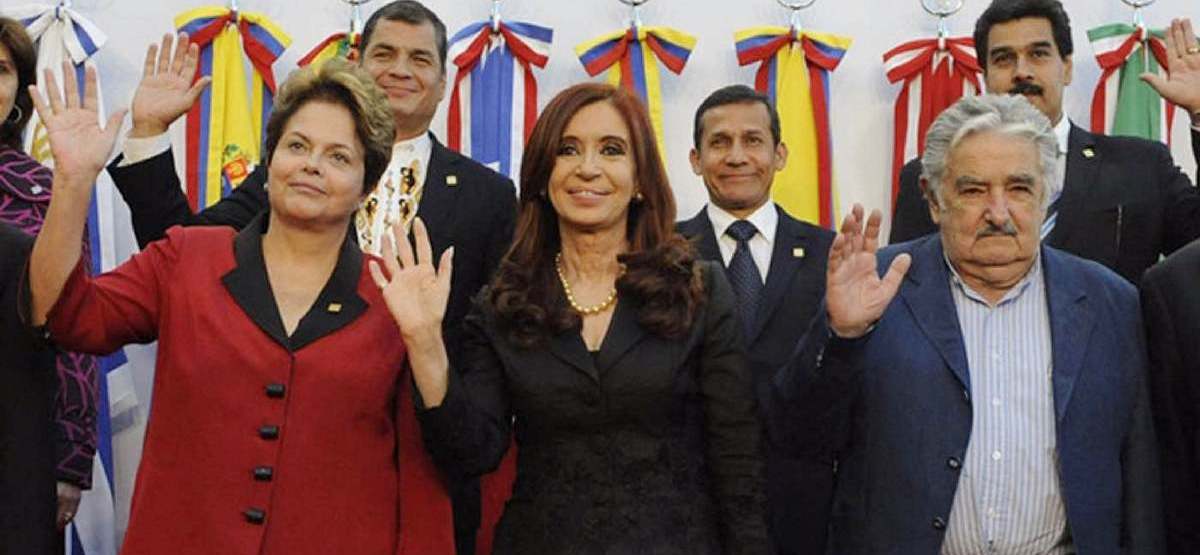
Buenos Aires meeting of current and former progressive leaders from
across Latin America and the Caribbean, November 24, 2018.
A "global week of action" was also organized from
November 26
to 30, under the banner "the G20 and IMF Out!" Activities
included a people's summit November 28 to 29 and a National
Day of Struggle in Buenos Aires against the G20 and IMF on
November 30.

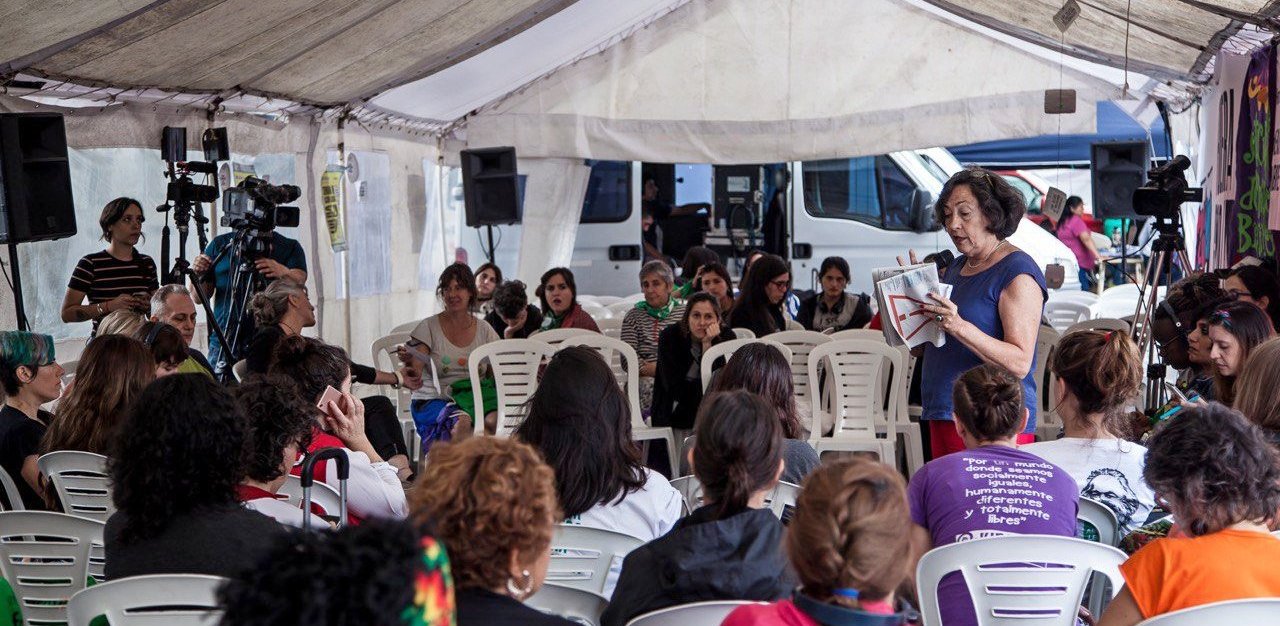
Peoples Summit, Buenos Aires, November 28-29, 2018.
As for the G20, the summit gave itself four priorities: "The Future of Work" -- pertaining to the impact of technological change on work; "Infrastructure for Development" -- aimed at "mobilizing private investment toward infrastructure [to close] the global infrastructure gap;" "A Sustainable Food Future" -- concerning food security as "an important link in the process of achieving stability and peace;" and "Gender Mainstreaming," where the G20 stated that "True development must put an end to gender inequality and guarantee women's work, digital and financial inclusion."
These priorities of course should be viewed in the context of the actual reality. In Canada, for example, workers are cast to the wind at the whim of supranational interests, quite apart from any technological changes. Private infrastructure is paid for with public monies to serve supranational interests. Food security is actively undermined through the destruction of supply management in agriculture, in subservience to the multinational conglomerates that dominate food production and in the name of free trade. Equality and rights for women in Canada have been achieved only insofar as the people have fought and won them, not because of governments, which pay only lip service to the situation facing women.
The self-congratulatory final eight-page statement of the Buenos Aires summit dovetails with its four priorities to put a human face on neo-liberal policies and agendas. All of it covers up a summit fraught with divisions and the inability of the G20 countries to resolve their differences, especially the contention between the big powers and their respective allies. None of it has anything to do with the reality faced by the peoples of the world and finding solutions to the problems they face.
Website: www.cpcml.ca Email: editor@cpcml.ca


 On the occasion of
International Human Rights Day, which this
year also celebrates the 70th anniversary of the adoption of the
Universal
Declaration of Human Rights in 1948, TML Weekly salutes
the peoples of the world who are waging a life and death struggle
to provide human rights with a guarantee. The fight for human
rights is testimony to the fact that societies are advanced
enough to express these rights and human beings are determined to
overcome their absence.
On the occasion of
International Human Rights Day, which this
year also celebrates the 70th anniversary of the adoption of the
Universal
Declaration of Human Rights in 1948, TML Weekly salutes
the peoples of the world who are waging a life and death struggle
to provide human rights with a guarantee. The fight for human
rights is testimony to the fact that societies are advanced
enough to express these rights and human beings are determined to
overcome their absence.
 The accusations against
others of violating human
rights have
proven to be well-orchestrated campaigns to divert attention from
what the U.S. imperialists and the "West" have been doing at any
particular time. At the time the Universal Declaration was
adopted, this expressed itself in the clash between the countries that
comprised the socialist camp and those that
comprised the capitalist camp. The socialist countries fought
against permitting rights to be treated as an abstraction while
there was no obligation to put in place the economic and social
conditions required for their realization. According to the U.S.
imperialist mantra, communism was based on the violation of human
rights and for this reason was to be overthrown. The overthrow
of communism was thus to prove the superiority of the U.S.
democracy and its defence of human rights. To this day they
continue to erect monuments to condemn the alleged crimes of the
communists while the crimes the U.S. imperialists and their
allies, including Canada, have carried out in the name of
freedom, democracy and human rights are to remain forgotten. But
history has its own cunning. Reality exists. Human beings not
only exist but they strive to humanize the social and natural
environment as a matter of their being human and this is what
settles scores with the old conscience of society.
The accusations against
others of violating human
rights have
proven to be well-orchestrated campaigns to divert attention from
what the U.S. imperialists and the "West" have been doing at any
particular time. At the time the Universal Declaration was
adopted, this expressed itself in the clash between the countries that
comprised the socialist camp and those that
comprised the capitalist camp. The socialist countries fought
against permitting rights to be treated as an abstraction while
there was no obligation to put in place the economic and social
conditions required for their realization. According to the U.S.
imperialist mantra, communism was based on the violation of human
rights and for this reason was to be overthrown. The overthrow
of communism was thus to prove the superiority of the U.S.
democracy and its defence of human rights. To this day they
continue to erect monuments to condemn the alleged crimes of the
communists while the crimes the U.S. imperialists and their
allies, including Canada, have carried out in the name of
freedom, democracy and human rights are to remain forgotten. But
history has its own cunning. Reality exists. Human beings not
only exist but they strive to humanize the social and natural
environment as a matter of their being human and this is what
settles scores with the old conscience of society. But the peoples all over the world,
on the basis of
their own
fight in defence of rights, have exposed their pretexts. The
imperialists respond by creating even more diversionary pretexts.
In the name of defending democracy, freedom and human rights they
are now defining rights in even more egregious ways, such as
turning their attention to rival business representatives who
they humiliate and criminalize because they have their
own interests and refuse to submit to their hegemony.
But the peoples all over the world,
on the basis of
their own
fight in defence of rights, have exposed their pretexts. The
imperialists respond by creating even more diversionary pretexts.
In the name of defending democracy, freedom and human rights they
are now defining rights in even more egregious ways, such as
turning their attention to rival business representatives who
they humiliate and criminalize because they have their
own interests and refuse to submit to their hegemony.










